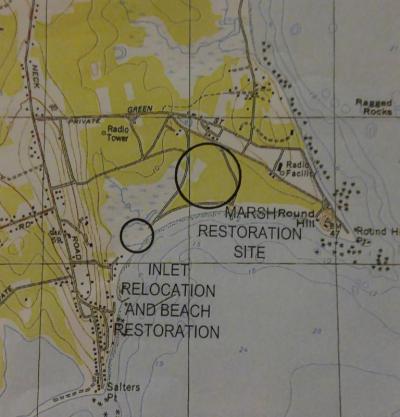Salt marsh restoration proposal for Round Hill causes safety, operational concerns
Plans to restore the 11.6-acre salt marsh at Round Hill Beach to its pre-Colonel Green influence are a point of concern for the Board of Parks and Recreation.
The project would restore the coastal wetland filled in by wealthy businessman Ned Green in 1928 to make room for an airport, but the Parks Board said it could also be a dangerous setting for beach-goers.
Approximately 72,000 cubic yards of sandy material will be removed to recreate the marsh, and vegetation will be restored to the area, said Georgeann Keer, Project Manager of the state Department of Fish and Game's Division of Ecological Restoration, at the March 23 Parks Board meeting. To restore tidal water flow, a now non-functioning culvert running under Ray Peck Drive will be replaced with a larger one, she added.
According to the U.S. Fish and Wildlife Service, the Round Hill Salt Marsh Restoration Project would improve drainage and tidal dynamics, better protecting the area from coastal flooding. It would also increase public involvement and education on coastal issues, and add recreational opportunities to the property with the addition of a walking path, officials said.
Parks Board Chair Joe Vieira voiced concerns about how the septic system that services the beach house restrooms could be affected, and potential safety and security issues with the new culvert. Board members also raised concerns that its larger design could make it an attraction to young children.
The project’s cost is still being worked out, but Keer said about $3.7 million in funding is available for the project from the New Bedford Harbor Trustee Council and the U.S. Fish and Wildlife Service Hurricane Sandy Relief Fund.
To reduce costs and permitting complexity, the walking trail along the restored marsh was scaled back, and a beach nourishment plan was scrapped, said Michael O'Reilly, Dartmouth’s environmental affairs coordinator.
The board did not vote to move forward with the permitting process, but opted for more time to sort through potential issues before giving the go ahead.
The restoration project is part of an effort to restore the shoreline of Buzzards Bay after the 2003 Bouchard Barge 120 120 oil spill, which released 98,000 gallons of oil. The spill affected 90 miles of shoreline, according to the Massachusetts Energy and Environmental Affairs office.
Wetland restoration is also intended to aid in the cleanup of New Bedford Harbor, which is still recovering from years of contamination from polychlorinated biphenyls (PCBs), Keer said. PCBs are industrial chemicals that were banned in 1979 due to impacts on human and environmental health, according to the National Oceanic and Atmospheric Administration.















